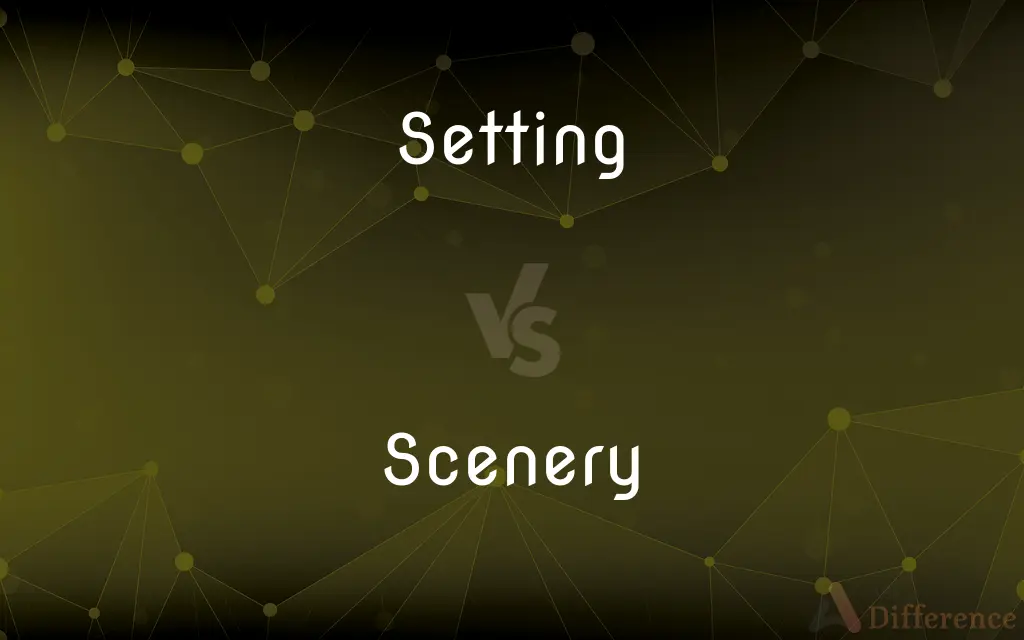Setting vs. Scenery — What's the Difference?
By Tayyaba Rehman — Updated on October 28, 2023
Setting refers to the time, place, and environment in which a story occurs. Scenery pertains to the visual features of a landscape. While setting encompasses a broader context, scenery focuses on visual details.

Difference Between Setting and Scenery
Table of Contents
ADVERTISEMENT
Key Differences
Setting is a crucial element in narratives, encompassing the overall backdrop where the events unfold. This includes the time, location, and cultural or societal circumstances. In literature, a novel's setting can provide readers with a deeper understanding of characters and plot dynamics.
Scenery, on the other hand, often emphasizes the visible, picturesque aspects of a location. It's the mountains in the background, the serene lakeside, or the bustling city streets. While scenery can be part of a setting, it specifically focuses on the visual or tangible features of a place.
Think of setting as the broader stage on which a story is performed. It provides the contextual background, helping audiences understand the world the characters inhabit. This world could be a specific era, a particular city, or even an entire fictional universe.
Scenery can be likened to the painted backdrops and props on a theater stage. It gives depth and visual appeal, enhancing the audience's experience. In movies, for instance, breathtaking scenery can make locations memorable and iconic.
In essence, while both terms relate to the environment, setting offers a comprehensive frame—encompassing time, location, and societal nuances. Scenery, meanwhile, beautifully fills in the visual details of that frame.
ADVERTISEMENT
Comparison Chart
Primary Meaning
The time, place, and environment in which events occur
The visual features of a landscape
Contexts
Literature, film, theater
Art, film, theater, photography
Emphasis
Contextual background (time, culture, environment)
Tangible and visual features
Usage
Describes where and when a story takes place
Refers to the picturesque aspect of a location
Associated Concepts
Historical period, societal norms, geographical location
Mountains, lakes, forests, cityscapes
Compare with Definitions
Setting
The place or surroundings where something happens.
The setting of the novel is a small Midwestern town.
Scenery
The visual aspect of a stage production.
The scenery for the musical was vibrant and detailed.
Setting
The time and place of the events in a story.
The film has a modern-day setting in New York City.
Scenery
The general appearance of a place in terms of its features.
The coastal scenery was dotted with lighthouses.
Setting
The position, direction, or way in which something, such as an automatic control, is set.
Scenery
The visual features of an area of land.
The mountain scenery was breathtaking.
Setting
The context and environment in which a situation is set; the background.
Scenery
Natural features that are visually pleasing.
Tourists come to enjoy the region's beautiful scenery.
Setting
The time, place, and circumstances in which a narrative, drama, or film takes place.
Scenery
The natural features of a landscape considered in terms of their appearance, especially when picturesque
Spectacular views of mountain scenery
Setting
(Music) A composition written or arranged to fit a text, such as a poetical work.
Scenery
The painted background used to represent natural features or other surroundings on a theatre stage or film set
They had all helped with scenery and costumes
Setting
A mounting, as for a jewel.
Scenery
A view or views of natural features, especially in open country
Enjoying the varied mountain scenery.
Setting
A place setting.
Scenery
Backdrops, hangings, furnishings, and other accessories on a theater stage or on a film or television set that represent the location of a scene.
Setting
A set of eggs in a hen's nest.
Scenery
View, natural features, landscape.
Setting
Present participle of set
Scenery
Stage backdrops, property and other items on a stage that give the impression of the location of the scene.
Setting
The time, place and circumstance in which something (such as a story or picture) is set; context; scenario.
Scenery
Assemblage of scenes; the paintings and hangings representing the scenes of a play; the disposition and arrangement of the scenes in which the action of a play, poem, etc., is laid; representation of place of action or occurence.
Setting
The act of setting.
The setting of the sun
The setting, or hardening, of moist plaster of Paris
Scenery
Sum of scenes or views; general aspect, as regards variety and beauty or the reverse, in a landscape; combination of natural views, as woods, hills, etc.
Never need an American look beyond his own country for the sublime and beautiful of natural scenery.
Setting
A piece of metal in which a precious stone or gem is fixed to form a piece of jewelry.
Scenery
The painted structures of a stage set that are intended to suggest a particular locale;
They worked all night painting the scenery
Setting
A level or placement that a knob or control is set to.
The volume setting on a television
Scenery
The appearance of a place
Setting
The act of marking the position of game, as a setter does.
Scenery
The painted background used in a theater.
The play's scenery depicted a quaint village.
Setting
Hunting with a setter.
Setting
Something set in, or inserted.
Setting
A piece of vocal or choral music composed for particular words (set to music).
Schubert's setting of Goethe's poem
Bach's setting of the Magnificat
Setting
The mounting of a play, etc., for the stage.
Setting
The direction of a current of wind.
Setting
That disappears below the horizon
The setting sun
Setting
The act of one who, or that which, sets; as, the setting of type, or of gems; the setting of the sun; the setting (hardening) of moist plaster of Paris; the setting (set) of a current.
Setting
The act of marking the position of game, as a setter does; also, hunting with a setter.
Setting
Something set in, or inserted.
Thou shalt set in it settings of stones.
Setting
That in which something, as a gem, is set; as, the gold setting of a jeweled pin.
Setting
The time, place, and circumstances in which an event (real or fictional) occurs; as, the setting of a novel.
Setting
The context and environment in which something is set;
The perfect setting for a ghost story
Setting
The state of the environment in which a situation exists;
You can't do that in a university setting
Setting
Arrangement of scenery and properties to represent the place where a play or movie is enacted
Setting
The physical position of something;
He changed the setting on the thermostat
Setting
A table service for one person;
A place setting of sterling flatware
Setting
Mounting consisting of a piece of metal (as in a ring or other jewelry) that holds a gem in place;
The diamond was in a plain gold mount
Setting
(of a heavenly body) disappearing below the horizon;
The setting sun
Setting
A position or arrangement, especially of a device.
Adjust the setting of the thermostat to lower the temperature.
Setting
The environment or ambiance created for a particular purpose.
The candlelit room provided a romantic setting.
Setting
The metal framework in which a gem is fixed.
The diamond was beautiful in its gold setting.
Common Curiosities
Is setting only used in literature?
No, setting can be used in film, theater, and other narratives to describe where and when events happen.
Can scenery refer to urban landscapes?
Yes, scenery can describe both natural landscapes and cityscapes.
Can setting influence a character's behavior?
Yes, the cultural and societal nuances of a setting can shape character behavior and decisions.
How does setting differ in historical fiction?
The setting in historical fiction is rooted in a specific historical period, adding authenticity to the narrative.
Does scenery only concern visuals?
Primarily, yes. Scenery emphasizes the visual features of a place.
Is scenery always natural?
No, scenery can be man-made, like city views or architectural landmarks.
Can scenery affect the viewer's perception of a film?
Yes, memorable and visually striking scenery can enhance viewer experience and immersion.
Does every story need a defined setting?
Most stories benefit from a defined setting for context, but some narratives may intentionally leave it ambiguous.
Is setting always about a physical location?
Mostly, but it also includes the time period and societal context.
Can a novel's mood be influenced by its setting?
Absolutely. The setting can deeply influence a story's tone, mood, and character interactions.
Can setting be fictional?
Yes, many works, especially in fantasy and science fiction, have entirely fictional settings.
Are props considered scenery?
In theater, props are distinct but can be part of the overall scenery or set design.
Is scenery used in theater?
Yes, scenery in theater refers to the painted backgrounds and props used on stage.
Is scenery limited to visual arts?
While it's primarily visual, references to scenery can also be made in literature to describe picturesque details.
Can settings change within a narrative?
Yes, stories can have multiple settings as characters move or as events unfold in different places and times.
Share Your Discovery

Previous Comparison
Jovian vs. Jovial
Next Comparison
Fix vs. CorrectAuthor Spotlight
Written by
Tayyaba RehmanTayyaba Rehman is a distinguished writer, currently serving as a primary contributor to askdifference.com. As a researcher in semantics and etymology, Tayyaba's passion for the complexity of languages and their distinctions has found a perfect home on the platform. Tayyaba delves into the intricacies of language, distinguishing between commonly confused words and phrases, thereby providing clarity for readers worldwide.















































